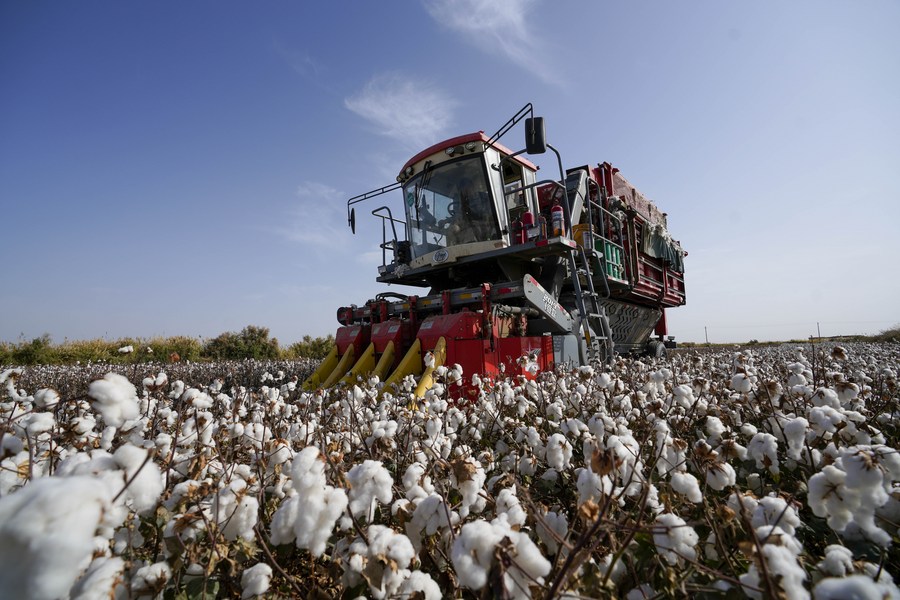Opinion: Washington's lie-filled Xinjiang Act bound to backfire

First, the US besmirched Xinjiang with its "lie of the century." Then, Washington staged its morality play to demonize and isolate China. Now, even cotton and tomatoes in the region have to prove their "innocence". (Graphic: Framing Cotton/People's Daily Online)
As the US is moving at a snail's pace on its gun control legislation, in which a picayune alteration in rhetoric is bragged as a big step forward, it has been acting at top speed, though, to enforce its preposterous "Forced Labor Prevention Act" targeting the Xinjiang region in China's northwest. The US federal law, which was devised last year and takes effect starting from June 21, spells out the malevolent sentiment the US has poured into the congenial region for years. Yet the Act is nothing about preventing imaginary "forced labor"; rather, it is all about preventing China's peaceful rise.
No nation is as seasoned and shameless as the US in fabricating such falsehoods to frame others, often drawing inspiration from its inglorious past. After all, this is the nation that faked "Saddam's anthrax" with a vial of washing powder, the one that cited imaginary weapons of mass destruction (WMDs) as a pretext for invading another country, the one that has been arduously weaving its global spy and surveillance webs and yet still brazenly calling itself a "victim" … In the case of Washington's relentless smear campaign against northwest China's Xinjiang, it has exacted its Hollywood-style mastery of fiction and fabrication, with its baseless reports, farcical hearings, and hideous funding of badmouthing campaigns, perfecting a great lie of the 21st Century.
But whether the Act is inspired by the American history of slavery, during which Black men and women were hand-picking cotton from sunrise to sunset, a practice that continued until the advent of the Machine Age, or represents a new invention by unapologetic US politicians and mainstream media, who are keen on cultivating American hegemony while demonizing anything in their way, the US Congress' bill (the Act) is ludicrous in itself (cotton and tomatoes grown in northwest China's Xinjiang are "guilty until proven innocent," seriously?), will do nobody any good and eventually boomerang back to haunt the Americans themselves.
To begin with, with a perfect storm of fierce inflation, food shortages, and an ongoing supply chain crisis, all of which the US is particularly susceptible to, the so-called "Forced Labor Prevention Act" as instituted by the US Congress will undoubtedly further disrupt the already fragile supply and demand, taking a heavy toll on the textile, agricultural and solar industries, among other areas. Xinjiang is home to about one-fifth of the global cotton production, and it is also a fertile (and highly-mechanized) land of high-quality fruits and vegetables, and a treasure trove of minerals, including the premium polysilicon used in the production of solar panels. Washington's witch-hunt and censorship over Made in Xinjiang products will effectively upset and ripple through the highly-intertwined global market. As Fortune magazine warned last week, the new Act "may result in customs agents holding cargo ships offshore and seizing bulk orders, all at a time when the American public is already weary from shortages of toilet paper and PPE and lumber and bicycles and now tampons."
The new Act, which is based on groundless accusations, will also unsettle American companies that enjoy robust business activities in China or heavily rely on Chinese-made components. It has been reported recently that Skechers, an American shoe brand, which viewed China as its second-largest market, has already had a batch of products manufactured in China seized by US customs authorities. In an article entitled Companies brace for chaos as Xinjiang import ban starts in US, Nikkei reported on June 20 that trade and business groups sounded the alarm that "the new legislation's vague wording threatens to put the bulk of China's $500 billion in annual shipments bound for the US at risk."

A cotton picker works in fields in Yuli County, northwest China's Xinjiang Uygur Autonomous Region, Oct. 15, 2021. (Xinhua/Zhao Ge)
At the end of the day, however, it is the common people, from both sides, who will bear the brunt of America's politically-charged smear campaign and "morality play." There are those laborious and kind-hearted people of China's Xinjiang Uygur Autonomous Region, who till the land, grow produce, and work tirelessly all year long, in the hopes of a good harvest, only to find their products all but marred by the scandalous "forced labor" label accompanying the groundless Act passed by the US Congress. (Not to mention that they now must live with yearslong libel hurled by the US mainstream media and American politicians who ostensibly care about the lives of Xinjiang's people.) There are also the American people themselves, who now have to pay a lie-based "moral taxes," added to currently soaring prices and worsening shortages prompted by record-high inflation and unremitting tariffs.
In this crescendo of Washington's "smearing Xinjiang" symphony, we all can hear the familiar note, one that is biased and hatred-driven and will ultimately slide into the grand cadenza of "containing China." US Secretary of State Antony Blinken might pretend that America's latest legislation on Xinjiang, together with Washington's unfounded "genocide" accusations, the CIA's anti-China spy center, the 500-million-dollar "badmouthing China" fund, the strengthening of quasi-NATO alliances in Asia, American-led tariffs and blacklisting, etc., are what makes the US a global leader and where its strength lies. But Secretary Blinken (or any US officials) could never cook America's moral book, inflation book, or shortage book, or even the US government's approval book.
And with the US Congress' ill-natured, lie-filled, bias-driven "Forced Labor Prevention Act," it is hard for the US not to shoot itself in the foot.
Photos
Related Stories
- US seeks dialogue with China to ease inflation pressure, ‘lifting additional tariffs is not a gift for bargaining’
- Reality Check: Falsehoods in US Perceptions of China
- China rebuts U.S. defense secretary's remarks on South China Sea, Taiwan
- U.S. urged to give up its obsession with containing China
- Commentary: Washington's small-clique politics won't fool SE Asia
Copyright © 2022 People's Daily Online. All Rights Reserved.









